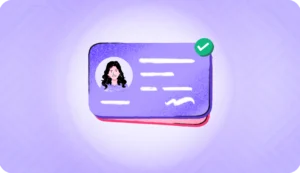Online Identity Verification Challenges & Trends
What is online identity verification?
We can define online identity verification as a method that uses computer technology to check a person’s identifying characteristics and confirm that they are who they say they are.
With the increase in fraudsters and cybercriminals taking advantage of mismanaged data and data leaks, a strong and reliable identity verification system ensures that people’s identities can be authenticated and their data can be stored securely.
Identity verification is necessary for the most common procedures such as opening a bank account, applying for any government ID, booking tickets etc. All these tasks have been made simple with advancements in technology but it also increased the threats to cybersecurity.
Companies are facing a rising demand to verify and validate their consumers. Online identity verification involves the process of verifying the identity of a user. It ensures and confirms your identity verification.
The complete concept of identity verification has matured past physically verifying every customer. Digital technologies have transformed the identity verification approach and made it more precise.
However, with positives, there are several challenges that organizations require to explore for finding the precise balance between user accessibility, fraud anticipation, and online identity verifications.
Significant Challenges and Trends in Online Identity Verifications
We have presented some of the challenges and trends in online identity verifications that deserve consideration:
- The Upsurge of Systemic Frauds
The highly advanced and modern-day technologies such as cloud computing have provided organizations with instantaneous resources to enable innovative products and services swiftly.
However, those same competencies are even being leveraged by fraudsters. The same is with advanced techniques like online identity verification.
Organizations failing to safeguard consumers against fraudsters could have actual penalties to face in the process, which is also one of the online identity verification challenges.
- The Diversity of ID Documents
When considering all legally issued ID documents and their historical forms, it is projected that there are around 6000+ ID document categories worldwide. Every document category has its fortifications against scams; however, some are effortlessly forged with others.
To validate an ID document, you require multiple elements and information of an individual. Also, experts need multifaceted analytics and algorithms to identify the explicit document type and certify that it is legitimate for an individual to authenticate his identity. So, building precise online identity verification solutions across this use case can be a big challenge.
- Troubles in Precision of Identity Verification
Enabling precise, well-organized, and user-friendly verifications is significant in sustaining a customer base and building a reliable service provider brand. This scenario highlights the blend of a swift, easy, and straightforward online identity verification process.
Performing repetitive verifications and ongoing tracking checks involves repeatedly screening existing customers for genuineness and trustworthiness.
However, customers always explore services with minimal friction and the highest level of serviceability before giving their personal information. So, robust technology is essential to save prolonged efforts and enable identity verification. Fraud anticipation and repeated Know Your Customer (KYC) procedures apply to this scenario. Lack of superior technology and proper back-end support in the KYC verification process make such repeated operations a big challenge for both consumers and involved stakeholders.
- Lack in Facilitating Consumer Experience and Trust
Failing to enhance digital trust and customer experience is one of the prime online identity verification challenges.
Higher-risk transactions and non-friendly databases are sufficient to collapse the customer experience. Building reliability in the marketplace and sustaining the same is significant to establish long-lasting business operations.
So, online identity and data management depend on a precise data handling solution. Unless service providers and organizations learn to enhance customer experience, this will stay a vital online identity verification challenge.
- Failing to Fulfill Data Privacy Regulations
With the rapid advancements in digital identity verification applications, compliance with data privacy regulations have turned highly significant.
While modern-day technologies are massive enablers of consumer-friendly services, this is even creating anxieties about data safety. Global benchmarks and regulations are catching up with high-tech progressions and offering support in safeguarding data.
The General Data Protection Regulation (GDPR) is explicitly an administrative structure for regulated organizations. Like GDPR, other directives such as Anti-Money Laundering Laws have been vital against terrorist funding and money laundering.
Not fulfilling these precise regulations makes it one of the prime challenges of digital identity verification.
- Issues in Identity Verification with Face Match
Facial recognition is the procedure of verifying an individual’s identity using their face. It fetches, analyzes, and matches patterns based on the individual’s facial specifics.
However, facial recognition is banned across San Francisco, Oakland, Boston, San Diego, Portland, and Somerville.
Confidentiality and civil rights apprehensions have intensified in many nations across the globe, and on 14th May 2019, San Francisco banned this technology concept of facial recognition. This scenario comprises law enforcement. So, enabling face match technology in some countries is a significant challenge.
How HyperVerge can Resolve Challenges in Online Identity Verification
HyperVerge is one of the leading Silicon Valley-based Artificial Intelligence (AI) companies. The HyperVerge Fintech Platform has successfully introduced Digital KYC, Fraud Checking, Data Verification, Credit Scoring, and Contract Verification technology solutions.
The HyperVerge Video KYC solution is developed as per benchmarked regulation and backs all obligatory requirements for online identity verification.
The video KYC solution enables customers’ geo-location and timestamp to be entrenched in the video. The location of the customer is cross-checked as per all the applied regulations.
The HyperVerge Video KYC solution includes PAN Verification, Artificial Intelligence (AI) Driven OCR, AI-Driven Liveness, and AI-Powered Face match.
AI-based face match checks consumer photographs and PAN and Aadhaar pictures with an accuracy > 99 percent even in lower bandwidths.
Customers choose HyperVerge as they put efforts to recognize their business and operational issues and resolve them. HyperVerge caters to clients such as Bajaj Finserv, Jio, ICICI, FE Credit, and other leading global players as the company’s technology solutions are robust and work at scale.
The Way Forward: Enablement of Online Identity Verification
So, keeping up with the rising demands of online identity verification and handling higher volumes of customer data sets is an essential component of any industry model, be it Financial Services, Security Domain, Telecom, Energy, or Defense Sector.
Therefore, technology must be restructured, and reflecting investments in sustaining safe platforms is significant. Not only will this safeguard your customer base, but it will save added efforts in resolving digital identity verification solutions.
At HyperVerge, Artificial Intelligence (AI) models for real-time image and video analysis dominate the industry with a precision of 99.5 percent and recall values of 99.3 percent.
Would you like more information about the HyperVerge fintech solutions and how you can set them across your workflow? If so, write to us at contact@hyperverge.co. Else please fill out our request form right here.





